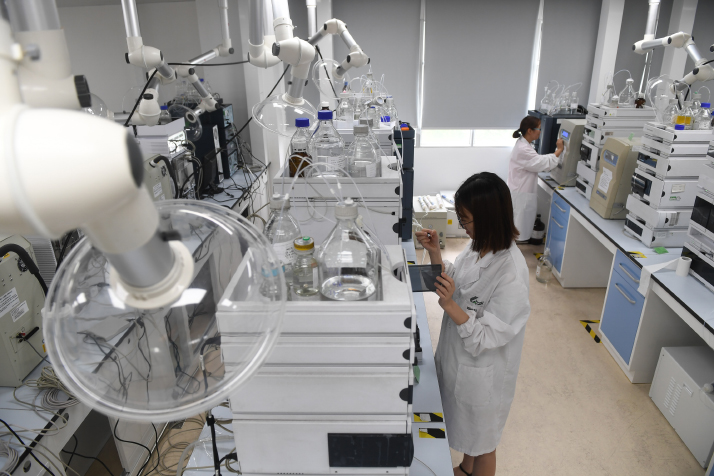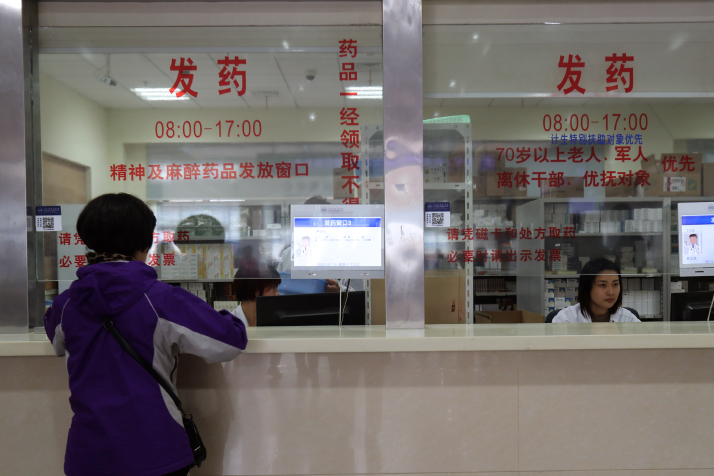| Business |
| Ready for Revision | |
| Reasonable adjustments in drug production and prices are expected to ensure steady supply | |
|
|
 Workers check the quality of medicines in a Nanjing-based pharmaceutical company's factory in Beijing on June 24 (XINHUA)
For the first time in China, authorities released a list of nearly three dozen generic medicines on June 21 so that pharmaceutical companies can develop and produce them. The 34 medicines include drugs whose patents have expired or face expiry as well as drugs in short supply, in a series of measures to ensure a steady supply of basic medicines and keep their prices stable so that buyers do not face financial pressure. Some drugs have been in short supply due to a variety of reasons. According to National Business Daily, many cities experienced a shortage of nitroglycerin tablets, used in heart conditions, with their price rising from 7 yuan ($0.99) per bottle of 100 tablets to more than 50 yuan ($7.1) in March. The shortage continued in some cities until June. The developments made the State Council, China's cabinet, decide at an executive meeting on August 16 that drug producers and sellers will be allowed a reasonable level of discretion to adjust the prices of medicines in short supply. Changes in prices Last year, as part of medical reforms, the Central Government introduced a pilot program to centralize the procurement of drugs. Pharmaceutical companies were asked to submit bids for generic drugs with the winners to be given a contract for supplying the bulk of the medicines to public hospitals in the pilot areas for a year. However, there were some snags. The same month the pilot program was introduced, the office for the centralized procurement of medicine and medical consumable items in Liaoning Province in northeast China, said the producers of six medicines had informed it that they had to suspend manufacturing because they could not buy enough raw materials. The producers of two medicines said they could not ensure supplies due to a hike in the price of raw materials while the prices of the medicines remained unchanged. Then on January 8, the centralized procurement service center in Inner Mongolia Autonomous Region in north China, issued a notice saying the sellers of 108 items had applied to withdraw from the list, citing reasons such as a hike in raw material prices, changes in production lines and pollution control measures. This triggered an investigation into 54 medicines said to be in short supply. Shi Lichen, founder of Beijing Dingchen Management Consulting, attributed the shortage mainly to unreasonably low prices, which dampened the enthusiasm of these medicine producers. "Many medicines in short supply are lowly priced on the government procurement list. The procurement prices remain unchanged for several years after the items are put on the list, while the market environment has been changing fast, with labor, raw material and financial costs rising," Shi told ThePaper.cn news website. As the prices of raw materials and labor costs surge, producers of cheap medicines are finding their profits dropping and some may even be suffering losses. This has affected their enthusiasm to produce those medicines and subsequently, caused a scarcity of these drugs.  A buyer purchases medicines at an outpatient dispensary in a Shanghai-based hospital on April 12 (XINHUA)
Price discretion The State Council meeting also decided to expand the pilot program of centralized procurement and utilization of medicines. In addition, drug producers will be allowed to adjust the prices of medicines on the national and provincial-level lists that are in short supply. However, the price hike must be reasonable, the State Council reiterated. Shi said the prices of many medicines in short supply have not been readjusted for many years, or have been only slightly adjusted. If their producers raise their prices once or twice the original price to cover the rising costs, it will be considered reasonable. But if the new price is dozens of times the original price, then it will be subject to government investigation. The authorities said they will also ensure adequate drug supplies through measures such as large-scale procurement and the increasing of bases for large-scale production. Shi said once allowed to revise drug prices, the companies will be able to better cover their costs and with a reasonable profit ensured, they will be more willing to produce these medicines. In addition, the large amount of medicines bought under the government's procurement system will ensure steady supplies and stable prices. Crux of the problem Although the government has issued a number of policies to address the shortage of some drugs, the fundamental solution involves the manufacturing of crude drugs, also known as active pharmaceutical ingredients (API), Shi said. In China, to produce a medicine, including pharmaceuticals and API, a company must have an approval number issued by the authorities and a Good Manufacturing Practice (GMP) certificate, which makes the process more complicated and time-consuming compared to the international practice, where a company has to only register to be allowed to produce API, Shi said. This stringent approval system, combined with environmental protection measures, has resulted in only a few enterprises producing API in China, leading to monopoly and a remarkable hike in crude drug prices. If a registration system is adopted, Shi said more producers will qualify to produce these crude drugs and the shortage can be fundamentally alleviated. According to Shi, relaxing the API production process will be the most effective way to solve the shortage. "The prices of drugs on the government procurement list keep decreasing, while API prices keep rising, making medicine producers unable to cover costs. As a result, medicines, especially cheap medicines, will disappear from the market," Shi told 21st Century Business Herald. Over the years, the government has issued several policies to address the shortage of medicines. A guideline issued in 2017 included creating the national and provincial-level lists of medicines in short supply, and establishing a national information collection and coordination platform for medicines in short supply. In 2018, the authorities announced collective production bases will be built for medicines in short supply. A senior official also said a monitoring network and an early-warning system at different levels, from the national to county levels, were set up to discover potential problems; and a long-term mechanism will be established to coordinate different departments to ensure a steady supply of medicines. Copyedited by Sudeshna Sarkar Comments to wangjun@bjreview.com |
|
||||||||||||||||||||||||||||
|